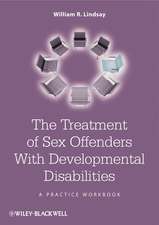Handbook of Juvenile Forensic Psychology and Psychiatry
Editat de Elena L. Grigorenkoen Limba Engleză Hardback – 18 feb 2012
The Handbook of Juvenile Forensic Psychology and Psychiatry explores these opportunities by emphasizing a developmental perspective, multifaceted assessment, and evidence-based practice in working with juvenile offenders. This comprehensive volume provides insights at virtually every intersection of mental health practice and juvenile justice, covering areas as wide-ranging as special populations, sentencing issues, educational and pharmacological interventions, family involvement, ethical issues, staff training concerns, and emerging challenges. Together, its chapters contain guidelines not only for changing the culture of detention but also preventing detention facilities from being the venue of choice in placing troubled youth.
Key issues addressed in the Handbook include:
- Developmental risks for delinquency.
- Race and sex disparities in juvenile justice processing.
- Establishing standards of practice in juvenile forensic mental health assessment.
- Serving dually diagnosed youth in the juvenile justice system.
- PTSD among court-involved youth.
- Female juvenile offenders.
- Juvenile sex offenders.
| Toate formatele și edițiile | Preț | Express |
|---|---|---|
| Paperback (1) | 2767.50 lei 6-8 săpt. | |
| Springer – 23 aug 2016 | 2767.50 lei 6-8 săpt. | |
| Hardback (1) | 2711.87 lei 6-8 săpt. | |
| Springer – 18 feb 2012 | 2711.87 lei 6-8 săpt. |
Preț: 2711.87 lei
Preț vechi: 3307.15 lei
-18% Nou
Puncte Express: 4068
Preț estimativ în valută:
518.99€ • 539.82$ • 428.45£
518.99€ • 539.82$ • 428.45£
Carte tipărită la comandă
Livrare economică 14-28 aprilie
Preluare comenzi: 021 569.72.76
Specificații
ISBN-13: 9781461409045
ISBN-10: 1461409047
Pagini: 620
Ilustrații: XXII, 596 p.
Dimensiuni: 178 x 254 x 37 mm
Greutate: 1.28 kg
Ediția:2012
Editura: Springer
Colecția Springer
Locul publicării:New York, NY, United States
ISBN-10: 1461409047
Pagini: 620
Ilustrații: XXII, 596 p.
Dimensiuni: 178 x 254 x 37 mm
Greutate: 1.28 kg
Ediția:2012
Editura: Springer
Colecția Springer
Locul publicării:New York, NY, United States
Public țintă
ResearchCuprins
Introduction.- Developmental changes in adolescence and risks for delinquency.- The “why(s)” of criminal behavior in juveniles: The long and the short of it.- Race and sex disparity in juvenile justice processing.- Major principles in a minor context: Forensic practices involving adolescents.- Juveniles and criminal responsibility evaluations.- Sentencing juveniles to life in prison without the opportunity for parole.- Transfer to adult court: Enhancing clinical forensic evaluations and informing policy.- Need for and barriers to inclusion in health research of justice-involved youth.- Toward establishing standards of practice in juvenile forensic mental health assessment.- Assessment in juvenile justice systems: An overview.- Mental health assessment of juveniles.- The juvenile forensic court clinic in theory and practice.- The history, development, and testing of forensic risk assessment tools.- Assessing juveniles for risk of violence.- Becoming more therapeutic: Motivational interviewing as a communication style for paraprofessionals in juvenile justice settings.- the junction of personality theories: Working with juvenile offenders.- Services for youth in closed settings: Gaps in services.- Implementing Evidence-Based Practices (EBPs) for juvenile justice prevention and treatment in communities.- Preventing early conduct problems and later delinquency.- Treating juvenile offenders: Best practices and emerging critical issues.- Psychopharmacological treatment of youth in juvenile justice settings.- IICAPS: A treatment model for delinquent youths with co-occurring mental health disorders.- Serving dually diagnosed youth in the juvenile justice system.- Treating juvenile sex offenders.- Sexually transmitted infections in juvenile offenders.- A self-Regulation Model for the Treatment of Pathological Juvenile Firesetters.- Mentor programming for at-risk youth.- Responding to child trauma: Theory, programs, and policy.- Psychosocial treatment of traumatized juveniles.- Posttraumatic Stress Disorder (PTSD) among youth involved in juvenile justice.- Trauma and Post Traumatic Stress Disorder among youth in the juvenile justice system: A Critical Appraisal.- Juvenile offenders with disabilities: Challenges and promises.- Ensuring that they learn.- Female juvenile offenders.- Juvenile gangs.- Juvenile forensic psychology and psychiatry: The movement toward data-based innovations.
Notă biografică
Dr. Elena L. Grigorenko received her Ph.D. in general psychology from Moscow State University, Russia, in 1990, and her Ph.D. in developmental psychology and genetics from Yale University, New Haven, CT, in 1996. Currently, Dr. Grigorenko is Associate Professor of Child Studies, Psychology, and Epidemiology and Public Health at Yale. Dr. Grigorenko has published more than 250 peer-reviewed articles, book chapters, and books. She has received awards for her work from five different divisions of the American Psychological Association (Divisions 1, 7, 10, 15, and 24); she also won the APA Distinguished Award for Early Career Contribution to Developmental Psychology. Dr. Grigorenko has worked with children and their families in the U.S. as well as in Africa (Kenya, Tanzania and Zanzibar, the Gambia, and Zambia), India, and Russia. Her research has been funded by the NIH, NSF, DOE, Cure Autism Now, the Foundation for Child Development, the American Psychological Foundation, and other federal and private sponsoring organizations.
Textul de pe ultima copertă
Juvenile justice centers have a long tradition as an unfortunate stop for young offenders who need mental health care. Reports estimate that as many as 70% of the youth in detention centers meet criteria for mental health disorders. As juvenile justice systems once again turn their focus from confinement to rehabilitation, mental health providers have major opportunities to inform and improve both practice and policy.
The Handbook of Juvenile Forensic Psychology and Psychiatry explores these opportunities by emphasizing a developmental perspective, multifaceted assessment, and evidence-based practice in working with juvenile offenders. This comprehensive volume provides insights at virtually every intersection of mental health practice and juvenile justice, covering areas as wide-ranging as special populations, sentencing issues, educational and pharmacological interventions, family involvement, ethical issues, staff training concerns, and emerging challenges. Together, its chapters contain guidelines not only for changing the culture of detention but also preventing detention facilities from being the venue of choice in placing troubled youth.
Key issues addressed in the Handbook include:
The Handbook of Juvenile Forensic Psychology and Psychiatry explores these opportunities by emphasizing a developmental perspective, multifaceted assessment, and evidence-based practice in working with juvenile offenders. This comprehensive volume provides insights at virtually every intersection of mental health practice and juvenile justice, covering areas as wide-ranging as special populations, sentencing issues, educational and pharmacological interventions, family involvement, ethical issues, staff training concerns, and emerging challenges. Together, its chapters contain guidelines not only for changing the culture of detention but also preventing detention facilities from being the venue of choice in placing troubled youth.
Key issues addressed in the Handbook include:
- Developmental risks for delinquency.
- Race and sex disparities in juvenile justice processing.
- Establishing standards of practice in juvenile forensic mental health assessment.
- Serving dually diagnosed youth in the juvenile justice system.
- PTSD among court-involved youth.
- Female juvenile offenders.
- Juvenile sex offenders.
Caracteristici
Explores the most critical issues in the field of forensic work with juveniles in the U.S
Focuses on the subspecialties of forensic psychiatry and psychology, applying leading-edge research and clinical knowledge to challenging legal issues
Draws key knowledge from a broad-base of researchers and professionals whose expertise is influencing the field
Captures different functional aspects of the U.S. juvenile justice system and associated services and fields of practice
Includes supplementary material: sn.pub/extras
Focuses on the subspecialties of forensic psychiatry and psychology, applying leading-edge research and clinical knowledge to challenging legal issues
Draws key knowledge from a broad-base of researchers and professionals whose expertise is influencing the field
Captures different functional aspects of the U.S. juvenile justice system and associated services and fields of practice
Includes supplementary material: sn.pub/extras

















